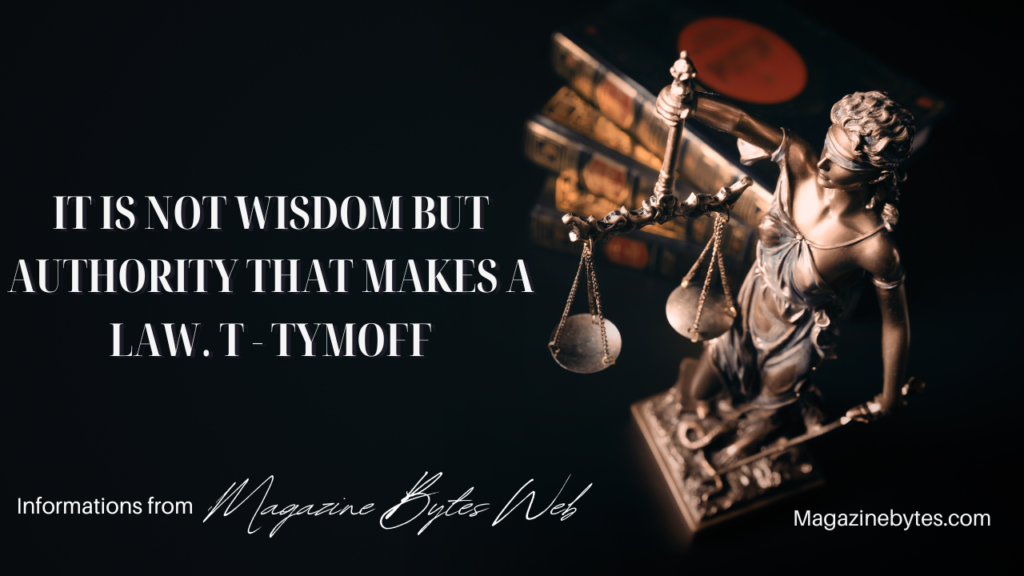
The balance between wisdom and authority has always been a focal point of debate in governance and societal order. The statement “it is not wisdom but authority that makes a law. t – tymoff” sheds light on a crucial aspect of legal frameworks. Understanding this concept requires delving into the nature of law, the role of authority, and the implications of prioritizing one over the other.
Defining Law and Authority
Laws are the backbone of any society, designed to maintain order, protect rights, and ensure justice. In this context, authority refers to the power vested in individuals or institutions to create and enforce these laws. Authority can manifest in various forms, such as governmental bodies, monarchies, or other ruling entities. These authorities are granted the legitimacy to govern and regulate, often irrespective of the wisdom behind their decisions.
Wisdom’s Role in Lawmaking
Wisdom, conversely, encompasses the knowledge, experience, and sound judgment that ideally guide decision-making. While wisdom can enhance the quality of laws, ensuring they are just and beneficial, it is not a requisite for their creation. This dichotomy suggests that while wisdom can influence laws, authority alone holds the power to enact them.
Historical Perspectives
Historically, many legal systems have been shaped more by authority than wisdom. Monarchs, dictators, and ruling classes have often imposed laws based on their interests rather than the collective good. Tymoff’s statement underscores this reality, pointing out that authority, not wisdom, holds the legislative power.
The Nature of Authority
Authority derives power from tradition, legal mandates, or even sheer force. This power can be absolute or limited, benevolent or tyrannical. The critical point is that authority, once established, can make and enforce laws regardless of their wisdom or moral grounding.
Consequences of Authority-Driven Lawmaking
When authority alone drives lawmaking, the consequences can be significant. Laws may reflect the interests of those in power rather than the populace’s needs, leading to injustice, inequality, and societal unrest. History offers numerous examples of laws enacted by authoritative regimes leading to oppression and conflict.
The Ideal Balance
The ideal scenario is a balance where authority is exercised with wisdom. Laws created with a foundation of knowledge are more likely to be just, fair, and beneficial to society. However, achieving this balance is challenging, requiring authorities to value and integrate wisdom into their decision-making processes.
Modern Legal Systems
In contemporary legal systems, efforts are made to incorporate wisdom into lawmaking. Democratic processes, checks and balances, and judicial reviews are mechanisms designed to ensure that laws are authoritative and wise. These systems strive to align authority with society’s collective wisdom.
Also Read: Minecraft: Bedrock Edition (2011) Game Icons Banners
Authority Without Wisdom
Despite these efforts, instances still arise where authority overrides wisdom. Politicians, driven by power or political gain, may enact laws that lack foresight or moral grounding. This underscores the persistent relevance of Tymoff’s observation in modern contexts.
Ethical Considerations
The ethical implications of authority-driven lawmaking are profound. Laws lacking wisdom can perpetuate injustice and harm. Therefore, those in positions of authority must seek knowledge, consult experts, and consider the broader impacts of their decisions.
The Role of Education
Educating leaders and the public about the importance of wisdom in lawmaking can mitigate the risks associated with authority-driven laws. An informed populace is better equipped to hold authorities accountable and advocate for laws that reflect collective wisdom.
Case Studies
Examining specific case studies of laws enacted purely based on authority reveals the pitfalls of this approach. The absence of wisdom in lawmaking has led to dire consequences, from oppressive regimes to corrupt governments.
Public Participation
Encouraging public participation in the legislative process is another way to infuse wisdom into lawmaking. When citizens have a voice, the resulting laws are more likely to reflect the community’s collective knowledge.
The Judiciary’s Role
The judiciary plays a crucial role in balancing authority with wisdom. Judicial systems can correct the course of authority-driven legislation by interpreting laws and assessing their alignment with ethical and moral standards.
Future Outlook
Looking ahead, the challenge remains to ensure that wisdom guides authority in creating laws. Technological advancements, social changes, and global interconnectedness require laws that are authoritative and wise.
Tymoff’s Relevance Today
Tymoff’s statement resonates, reminding us that authority’s power to make laws must be tempered with wisdom. As societies evolve, pursuing wisdom in lawmaking remains a critical endeavor.
Conclusion
In conclusion, while authority can create laws, integrating wisdom is essential for justice and societal well-being. The statement “it is not wisdom but authority that makes a law. t – off” is a poignant reminder of the need to balance power with insight and understanding.
Also Read: Ark: Survival Evolved (2017) Game Icons Banners
Call to Action
Leaders and citizens must strive to ensure that laws are founded on authority and wisdom to move towards a more just society. This involves continuous education, public participation, and vigilant oversight of those in power.
Reflection
Reflecting on Tymoff’s words encourages us to critically evaluate our legal systems and advocate for a governance model where wisdom and authority coexist harmoniously, fostering a just and equitable society for all.
Embracing Change
Finally, embracing change and adapting our legal frameworks to incorporate wisdom ensures that laws evolve with societal progress, securing a better future for future generations.
By critically examining the balance between wisdom and authority in lawmaking, we can better understand the complexities of governance and strive toward a more enlightened and just legal system.
[…] Also Read: It Is Not Wisdom But Authority That Makes A Law. T – Tymoff […]
[…] Also Read: It Is Not Wisdom But Authority That Makes A Law. T – Tymoff […]